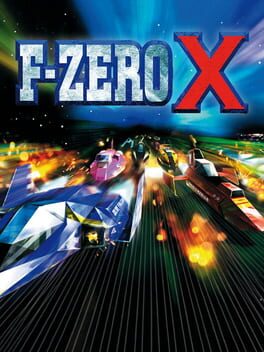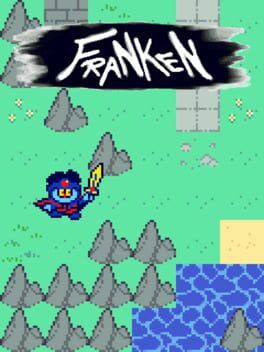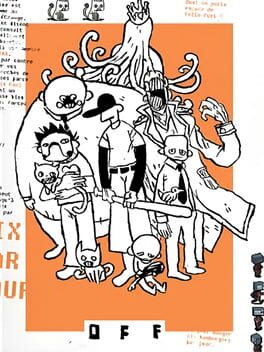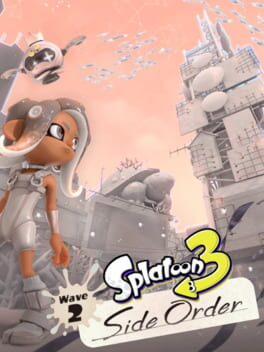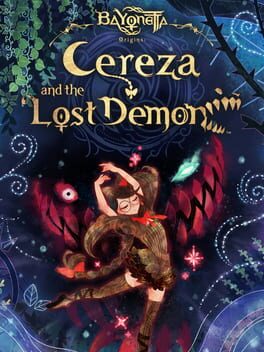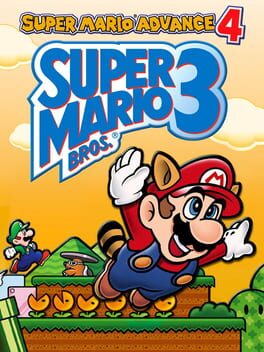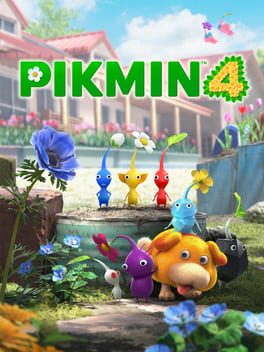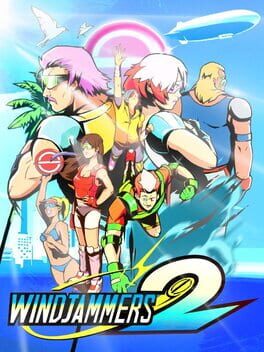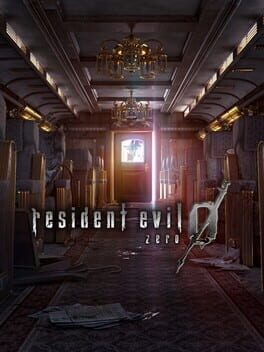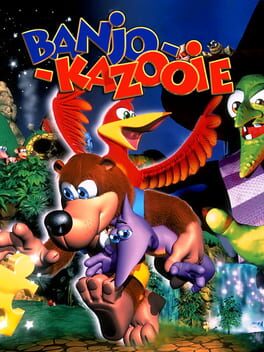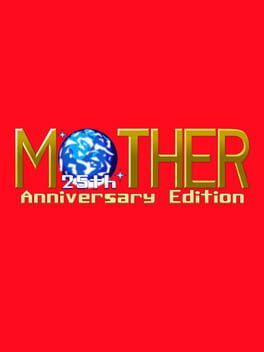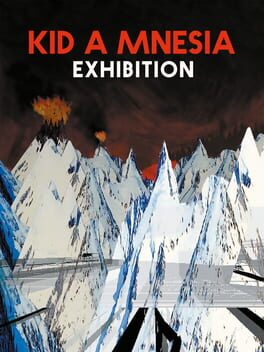Hylianhero777
1998
I am not even good enough to get consistent wins on Standard difficulty, but I can't help but be blown away by how good this is. A genuinely challenging racer with great track design and possibly the most legit sense of moving at blistering fast speed I've ever felt in a video game. The slightest touch of the control stick will send your racer careening off in that direction, so micro movements and mastery of the drift is key. This very touchy control at such a high speed combined with the difficulty makes each race white knuckle. The boost being tied to your health is such an astoundingly simple yet well thought out risk/reward mechanic that I'm shocked every arcade racer didn't start copying it. Total masterclass of a game.
Oh yeah and the soundtrack freaking rules
Oh yeah and the soundtrack freaking rules
2022
Woman who worked on Deltarune and more importantly designed the concept for Mickey's Dick Smasher makes a quick and breezy hour long parody of the quirky indie RPG. It's fun! Was thinking about how the battle system was an (even more stripped down to the point of basically being perfunctory, though that's kind of the joke) version of The Frog For Whom the Bell Tolls, so it was fun to have my gamer street cred validated there when I saw that game show up in the credits.
2008
Huge points for originality here. Pretty much anything that can still get me going "oh, games can have a vibe like this?" especially after having seen so many top down RPGs of both the retro and indie variety earns some major respect from me. I don't think the battle system ended up super interesting at the end of the day, but the game's world and narrative make up for that to me. No spoilers but while it goes for a metanarrative route that is pretty old hat at this point by the end I do think the execution here is actually much better than other games with much bigger budgets that have attempted the same thing. But yeah idk mostly just vibing with this and appreciating how cool its world is. The simple graphics hide how conceptually interesting/evocative some of it's worldbuilding ideas are, like damn the sea of plastic, the smoke mines... letting your mind fill in the blanks using the dialogue as a starting point really conjures some wild imagery. So yeah! I'd definitely recommend this to anyone looking for a creative and well paced RPG with an interesting story.
Seems a lot of the big reviews here for this one compare it favorably to Bayo 3 and as someone who liked Bayo 3 quite a bit I wouldn't say that. That said this is still a damn solid game in its own right. Presentation is really charming (the voice cast is incredible!) and I think they managed to pull off the Brothers, A Tale of Two Sons control scheme quite well. The puzzles and exploration are also well done but I did find exploring hampered by an extremely unhelpful map and a fast travel system with limitations that I swear were imposed mainly to pad out the game length which made this a real pain to go for 100% in. The combat I'm rather mixed on - I get the idea behind having Cereza focus exclusively on binding enemies to avoid too much mental overload controlling both characters at once, but often this just led to me circle strafing with her and holding ZL while Cheshire does all the real work. All in all this was still a very charming game and I hope to see more stuff like this come out of Platinum as despite liking Bayo 3 quite a bit you can tell that they are having some big scope creep issues in a lot of their larger, more "AAA" titles of late.
2016
This review contains spoilers
Holy shit that was a lot to process.
Thing is I honestly haven't finished processing it yet either. I think I actually did a pretty good job understanding the plot all the way through Lifecut which scrambled my brain around 5 or 6 separate times. I'm still working out what exactly the shelter kids plan was meant to accomplish vs what it did accomplish/ what actually happened in the titular Silver Case event/what the fuck exactly Kusabi's motives were throughout that whole chapter. (Would love for people to sound off in the comments with their own questions and interpretations). Some of this stuff I don't think I'm meant to know definitively, but the game was throwing twists at me so fast that I hardly had time to hang on. Not a bad thing! I appreciated having a game that really challenged me on a story level.
What I do have a much more firm grasp on however were the themes of this game, and boy is this a masterclass of thematic writing. Kind of amazing that it was made in 1999 with how much it gets right about our post internet/post truth future. There will always be another Kamui, there will always be another Ayame, so long as the society and the powers in control create a need for them. Likewise, whether the faction is FSO, TRO, or CCO - it doesn't matter. It's all the same bullshit at the end of the day. Opportunities are seized and narratives are shaped to manufacture (in this case, quite literally) a controlled population. This is just some really good fucking stuff.
If I had any negatives - I do think that case #2 is significantly weaker, despite being a pretty good story in isolation, and I also think that some segments are somewhat needlessly drawn out. When going through the shelter towers at the end of the game, I thought about why Suda decided to make this such a slog... and I do think that slowly exploring those identical towers did give both a sense of how sterilized/uniform they were and the scale of just how many people were down there. That said, I think it came at the cost of slowing the narrative momentum to a halt right at the climax, which maybe wasn't for the best.
Anyway yeah this was pretty fucking cool, did I mention how insanely good the presentation is? A bit weird/confusing that character art is inconsistent between the Transmitter and Placebo stories, but man, what they do with blending various types of media, aspect ratios, and backgrounds in this is so stylish. The music is top notch too. Special mention to that one track I can only describe as "fucking evil" that plays during some of the board meetings in Parade and a few other places as well I believe.
Going to leave you all with some recommendations: if you're into this "serial killer is not a concretely real person but a memetic virus that's a metaphor for societal ills" deal, check out Paranoia Agent and Ghost in the Shell: Stand Alone Complex! Again, kind of wild that this predates both of those because I was thinking in my head it must have been influenced by at least one of them before I checked the dates.
EDIT: This has only gone up in my estimation the more I reflect on it. Bumping my score.
Thing is I honestly haven't finished processing it yet either. I think I actually did a pretty good job understanding the plot all the way through Lifecut which scrambled my brain around 5 or 6 separate times. I'm still working out what exactly the shelter kids plan was meant to accomplish vs what it did accomplish/ what actually happened in the titular Silver Case event/what the fuck exactly Kusabi's motives were throughout that whole chapter. (Would love for people to sound off in the comments with their own questions and interpretations). Some of this stuff I don't think I'm meant to know definitively, but the game was throwing twists at me so fast that I hardly had time to hang on. Not a bad thing! I appreciated having a game that really challenged me on a story level.
What I do have a much more firm grasp on however were the themes of this game, and boy is this a masterclass of thematic writing. Kind of amazing that it was made in 1999 with how much it gets right about our post internet/post truth future. There will always be another Kamui, there will always be another Ayame, so long as the society and the powers in control create a need for them. Likewise, whether the faction is FSO, TRO, or CCO - it doesn't matter. It's all the same bullshit at the end of the day. Opportunities are seized and narratives are shaped to manufacture (in this case, quite literally) a controlled population. This is just some really good fucking stuff.
If I had any negatives - I do think that case #2 is significantly weaker, despite being a pretty good story in isolation, and I also think that some segments are somewhat needlessly drawn out. When going through the shelter towers at the end of the game, I thought about why Suda decided to make this such a slog... and I do think that slowly exploring those identical towers did give both a sense of how sterilized/uniform they were and the scale of just how many people were down there. That said, I think it came at the cost of slowing the narrative momentum to a halt right at the climax, which maybe wasn't for the best.
Anyway yeah this was pretty fucking cool, did I mention how insanely good the presentation is? A bit weird/confusing that character art is inconsistent between the Transmitter and Placebo stories, but man, what they do with blending various types of media, aspect ratios, and backgrounds in this is so stylish. The music is top notch too. Special mention to that one track I can only describe as "fucking evil" that plays during some of the board meetings in Parade and a few other places as well I believe.
Going to leave you all with some recommendations: if you're into this "serial killer is not a concretely real person but a memetic virus that's a metaphor for societal ills" deal, check out Paranoia Agent and Ghost in the Shell: Stand Alone Complex! Again, kind of wild that this predates both of those because I was thinking in my head it must have been influenced by at least one of them before I checked the dates.
EDIT: This has only gone up in my estimation the more I reflect on it. Bumping my score.
2023
It's really cool that despite them all being so mechanically similar, all 4 Pikmin games feel so distinct from each other.
Pikmin 1 is the atmospheric one focused primarily on time management
Pikmin 2 is the kind of bullshit hard dungeon crawler
Pikmin 3 is the one that leans most heavily into the RTS elements
and Pikmin 4, finally, is the "adventure game," for better and worse!
I can see some hardcore Pikmin fans being somewhat disappointed with the direction this took, and even I kind of had moments of concern with the overlong tutorial and the inclusion of... rpg elements (that's right, welcome to modern AAA, Pikmin) but I gotta say for that being what it is, I ended up liking it quite a lot! It helps that this is definitely the most fully featured Pikmin yet, with lots of variety in the main campaign and basically an entire game after the credits (it's quite frankly weird that they put the credits where they did here). Integrating the mission mode and multiplayer directly into the campaign was a really smart move, breaks up the pace nicely and makes it much more likely that players actually engage with these elements, which have always been the unsung heroes of prior Pikmin games.
Another quick note - the Treasure catalog and Piklopedia entries (especially when more is unlocked for each entry postgame) are some of the best Nintendo writing of the Switch era, equal parts hilarious and at times touching. Wonderful stuff.
Pikmin 1 is the atmospheric one focused primarily on time management
Pikmin 2 is the kind of bullshit hard dungeon crawler
Pikmin 3 is the one that leans most heavily into the RTS elements
and Pikmin 4, finally, is the "adventure game," for better and worse!
I can see some hardcore Pikmin fans being somewhat disappointed with the direction this took, and even I kind of had moments of concern with the overlong tutorial and the inclusion of... rpg elements (that's right, welcome to modern AAA, Pikmin) but I gotta say for that being what it is, I ended up liking it quite a lot! It helps that this is definitely the most fully featured Pikmin yet, with lots of variety in the main campaign and basically an entire game after the credits (it's quite frankly weird that they put the credits where they did here). Integrating the mission mode and multiplayer directly into the campaign was a really smart move, breaks up the pace nicely and makes it much more likely that players actually engage with these elements, which have always been the unsung heroes of prior Pikmin games.
Another quick note - the Treasure catalog and Piklopedia entries (especially when more is unlocked for each entry postgame) are some of the best Nintendo writing of the Switch era, equal parts hilarious and at times touching. Wonderful stuff.
2022
I feel the hype around Windjammers 2 died down somewhat with it's long reveal to release period, and that's a shame because this ended up turning out great! Doesn't mess with perfection, just gives the original a fresh, very pleasant coat of paint, with new characters and stages that add some pretty fun extra wrinkles to things. The only new universal mechanic, the jump/smash, adds just enough extra complexity and feels great to pull off without overcomplicating the core game. Plus the online seems to work pretty dang well (though no spectator mode/lobbies is a big oversight and something I hope they may patch in later). Play this game!
2016
It is absolutely amazing how a single design decision like the removal of item boxes can absolutely cripple an entire game. That's far from the only problem though. Small QOL issues like picking up items/loading new areas/inventory screens all being obnoxiously slow are rampant. The story is pretty undercooked and uninteresting, and the main villain is definitely campy, but not the type of campy I like out of Resident Evil. The map design also makes traversal a huge chore and the amount of pointless backtracking is very high. Positives: Rebecca and Billy are both great, visually it's very impressive... ehhh
Man this was really, really hard to parse for me...
Again something I'd love to sit down and talk to people on this site about in depth. In my opinion even remotely comprehending this thing is more difficult than a lot of "difficult games" but I gotta say for what I did understand, it did really resonate with me.
Another stylistic triumph for Suda and crew. While I miss some of the more experimental live action/animated video sequences in The Silver Case (probably wouldn't fly on 2005 mobile phones), 25th Ward does make up for that somewhat with a more consistent (though still varied between storylines) striking high contrast artstyle. I also really enjoyed how it managed to sample visual/audio elements from across Grasshopper's work up to that point and merge it all into a cohesive whole. The music is also stellar, though I will say a lot of the best material is remixed from The Silver Case as well.
The characters here - a lot of the extended cast isn't given as much time to shine (this is actually lampshaded in Suda's Red, Blue, and Green which I found quite funny) but those that are central to the plot manage to be incredibly interesting, both as characters unto themselves and as vessels for ideas. Hell, on top of thematically following up on basically every theme and plot point from The Silver Case, The 25th Ward also goes way deeper into the very nature of the self. I could go on and on about all of that central cast and probably confuse the shit out of myself and everyone else in the process but I don't think it'd do it any justice. To sum it up - what I did grab a hold of really was great stuff. Shiroyabu's shocking transformation, Kurumizawa's contradictory existence, Tokio's journey of quite literal self discovery, and perhaps my favorite (one of the most straightforward too, which is saying something) - Meru, the "girl who was plugged in" all felt like pointed critiques of our society while at the same time just being emotionally investing on a character level.
Now that I've caught up on Suda's directorial work, I feel like I'm still processing all of it. I could see my opinions on all the games I've gone through over the past two months rising or falling with more time, but I know they're going to stick with me forever, to keep me thinking, to keep me confronting - and maybe killing - my past.
...man that last line sucked. Who the fuck writes this shit? I should fuckin' kill their ass. Whatever.
Again something I'd love to sit down and talk to people on this site about in depth. In my opinion even remotely comprehending this thing is more difficult than a lot of "difficult games" but I gotta say for what I did understand, it did really resonate with me.
Another stylistic triumph for Suda and crew. While I miss some of the more experimental live action/animated video sequences in The Silver Case (probably wouldn't fly on 2005 mobile phones), 25th Ward does make up for that somewhat with a more consistent (though still varied between storylines) striking high contrast artstyle. I also really enjoyed how it managed to sample visual/audio elements from across Grasshopper's work up to that point and merge it all into a cohesive whole. The music is also stellar, though I will say a lot of the best material is remixed from The Silver Case as well.
The characters here - a lot of the extended cast isn't given as much time to shine (this is actually lampshaded in Suda's Red, Blue, and Green which I found quite funny) but those that are central to the plot manage to be incredibly interesting, both as characters unto themselves and as vessels for ideas. Hell, on top of thematically following up on basically every theme and plot point from The Silver Case, The 25th Ward also goes way deeper into the very nature of the self. I could go on and on about all of that central cast and probably confuse the shit out of myself and everyone else in the process but I don't think it'd do it any justice. To sum it up - what I did grab a hold of really was great stuff. Shiroyabu's shocking transformation, Kurumizawa's contradictory existence, Tokio's journey of quite literal self discovery, and perhaps my favorite (one of the most straightforward too, which is saying something) - Meru, the "girl who was plugged in" all felt like pointed critiques of our society while at the same time just being emotionally investing on a character level.
Now that I've caught up on Suda's directorial work, I feel like I'm still processing all of it. I could see my opinions on all the games I've gone through over the past two months rising or falling with more time, but I know they're going to stick with me forever, to keep me thinking, to keep me confronting - and maybe killing - my past.
...man that last line sucked. Who the fuck writes this shit? I should fuckin' kill their ass. Whatever.
1998
Oh wow people weren't just overrating this due to nostalgia it's actually good what the heck
What aged well:
- The music. Grant Kirkhope is imo not nearly on the level of David Wise, but I do think this is some of his best work. Charming and catchy.
-The movement. Look, the movement options in Banjo are moreso a set of discrete states that you can switch between, rather than something fluid, dynamic, and momentum focused like Mario 64. That said each of those states does feel good on its own and the rate at which you unlock them is perfectly paced.
- The level design: It's by far the best part of the game and it's frankly astonishing that it's this good. As one of the first "collectathons" Banjo gets everything that makes that sort of game engaging. A wide variety of objectives, worlds that are big enough to explore but small enough to not feel like a slog, and secrets around every corner. For being Rare's very first 3D platformer they set a standard here that would not be matched for several years, from what I hear of DK64 and Tooie, especially not from their own games...
-The credits. Folks, games need to bring back credits sequences where they treat every enemy and boss as a "cast member" and have a big roll call where we get to see all their names and they do a little fun animation. What are we even doing out here in the modern era of the medium that we've forgotten this great joy of the video game platformer.
What didn't age well:
- The last two worlds: Ok I said the level design was great and on the whole it absolutely is but I think Rare's idea of ramping up the challenge for the end was "make one world have tons of opportunities for cheap deaths that make you collect every note in the level over again" and "make a world so huge that it's impossible to figure out where you missed something" and that's certainly not how I'd like to see it done.
-The final boss: Between this and the last two worlds Banjo's biggest problem is sticking the landing. This is just not a well designed fight and relies exclusively on your mastery of the two jankiest moves in the game.
-The camera: I can give a pass on this considering the time it came out but yeah of course the camera is bad lol
-The humor: Kazooie can be funny at times but man this just comes off as mean spirited (and straight up offensive to overweight people pretty much constantly). A bit of it's time as well in that respect unfortunately.
As someone who grew up just after this era and has never really known how much of the mythologizing of Rare (especially N64 Rare) was warranted, this game is the proof that Rare really did have something special going on that translated into 3D. Was nice to experience it for the first time and find it lived up to the hype.
What aged well:
- The music. Grant Kirkhope is imo not nearly on the level of David Wise, but I do think this is some of his best work. Charming and catchy.
-The movement. Look, the movement options in Banjo are moreso a set of discrete states that you can switch between, rather than something fluid, dynamic, and momentum focused like Mario 64. That said each of those states does feel good on its own and the rate at which you unlock them is perfectly paced.
- The level design: It's by far the best part of the game and it's frankly astonishing that it's this good. As one of the first "collectathons" Banjo gets everything that makes that sort of game engaging. A wide variety of objectives, worlds that are big enough to explore but small enough to not feel like a slog, and secrets around every corner. For being Rare's very first 3D platformer they set a standard here that would not be matched for several years, from what I hear of DK64 and Tooie, especially not from their own games...
-The credits. Folks, games need to bring back credits sequences where they treat every enemy and boss as a "cast member" and have a big roll call where we get to see all their names and they do a little fun animation. What are we even doing out here in the modern era of the medium that we've forgotten this great joy of the video game platformer.
What didn't age well:
- The last two worlds: Ok I said the level design was great and on the whole it absolutely is but I think Rare's idea of ramping up the challenge for the end was "make one world have tons of opportunities for cheap deaths that make you collect every note in the level over again" and "make a world so huge that it's impossible to figure out where you missed something" and that's certainly not how I'd like to see it done.
-The final boss: Between this and the last two worlds Banjo's biggest problem is sticking the landing. This is just not a well designed fight and relies exclusively on your mastery of the two jankiest moves in the game.
-The camera: I can give a pass on this considering the time it came out but yeah of course the camera is bad lol
-The humor: Kazooie can be funny at times but man this just comes off as mean spirited (and straight up offensive to overweight people pretty much constantly). A bit of it's time as well in that respect unfortunately.
As someone who grew up just after this era and has never really known how much of the mythologizing of Rare (especially N64 Rare) was warranted, this game is the proof that Rare really did have something special going on that translated into 3D. Was nice to experience it for the first time and find it lived up to the hype.
“Well then, Mr. Mondo, from everything you have experience so far… how would you explain all of this?”
“Does it have to be explained? I don’t believe it does.”
Beautiful game. While for whatever reason I didn't feel quite as much of an emotional attachment as I did with The Silver Case, this is every bit as thematically dense and quite a bit more hilarious. Truly one of the funniest games I've played, and most of that fun is being had at the player's expense. Despite this, the game never twists the knife after it stabs you, providing in my opinion just enough antagonism to make you feel like a moron for playing it, but not enough to make you stop playing.
Especially when the story here is as gripping as it is! While my aforementioned lack of any big gut punch emotionally did have this fall short of being a total revelation for me story wise, the mystery of what exactly is going on, the greatly enjoyable characters, and the relaxing, contemplative vibe of the setting absolutely kept me hooked on it. Going to go with a hackneyed Lynch comparison again but Suda seems to understand mysteries in the same way he does. By not conclusively solving the mystery, or by presenting conflicting, dense layers of information, it invites the audience to think more about the characters and themes.
Again I invite people to talk about their own interpretations and thoughts on this game in the comments! Until next time,
I'm getting that DS feeling...
“Does it have to be explained? I don’t believe it does.”
Beautiful game. While for whatever reason I didn't feel quite as much of an emotional attachment as I did with The Silver Case, this is every bit as thematically dense and quite a bit more hilarious. Truly one of the funniest games I've played, and most of that fun is being had at the player's expense. Despite this, the game never twists the knife after it stabs you, providing in my opinion just enough antagonism to make you feel like a moron for playing it, but not enough to make you stop playing.
Especially when the story here is as gripping as it is! While my aforementioned lack of any big gut punch emotionally did have this fall short of being a total revelation for me story wise, the mystery of what exactly is going on, the greatly enjoyable characters, and the relaxing, contemplative vibe of the setting absolutely kept me hooked on it. Going to go with a hackneyed Lynch comparison again but Suda seems to understand mysteries in the same way he does. By not conclusively solving the mystery, or by presenting conflicting, dense layers of information, it invites the audience to think more about the characters and themes.
Again I invite people to talk about their own interpretations and thoughts on this game in the comments! Until next time,
I'm getting that DS feeling...
Having only listened to In Rainbows and A Moon Shaped Pool, going into this with my friend who is a massive Radiohead fan was an absolute blast. Like having an expert tour guide who knew all of the history, but the museum was just renovated so they have no idea where anything is. Discovering it all, marveling at each of the little details, and then just basking in the showstopper visual moments that it manages to build together made for a truly magical night. Time to finally go and listen to these albums now
